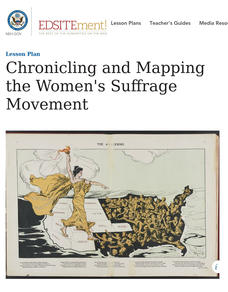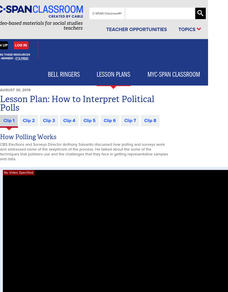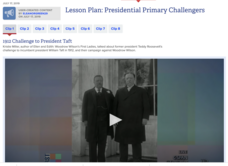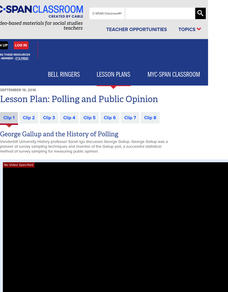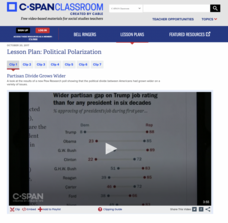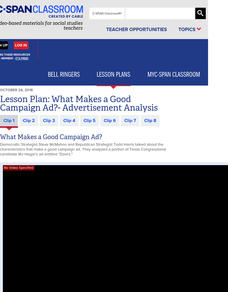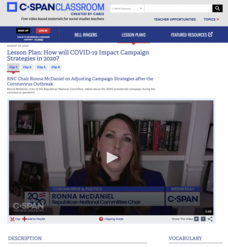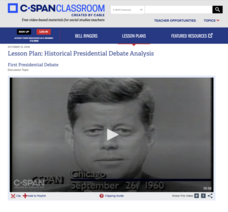National Endowment for the Humanities
The Matter of the Philippines
The United States won the Spanish-American War, so now what? Young scholars act as advisors to President McKinley and use primary sources to recommend what America should do with its territories. Using a variety of perspectives—including...
National Endowment for the Humanities
The Power of the Majority over Thought
While Alexis de Tocqueville mourned a lack of "freedom of discussion" in America in the early republic, today's pupils are concerned about peer pressure. Using excerpts of de Tocqueville's writing and discussion questions, scholars...
National Endowment for the Humanities
Chronicling and Mapping the Women's Suffrage Movement
While women's suffrage is often believed to be the result of a single constitutional amendment, the effort of women to secure the vote spanned decades and continents. Using primary sources in online archives, class members explore the...
National Endowment for the Humanities
Oyez! Oyez! Oyez!: Simulating the Supreme Court
Students have freedom of speech—or do they? Using an actual court case and research materials on the Supreme Court, young legal scholars examine the Supreme Court's role and history. Then, they argue a case the court declined to hear and...
National Endowment for the Humanities
“From Time to Time”: Presidents and Communicating with the Public
While the Constitution requires a "State of the Union" address, it doesn't give many details. In fact, it wasn't until Woodrow Wilson that the periodic update to Congress was given in-person. Using primary sources, recordings and...
C-SPAN
How to Interpret Political Polls
While numbers don't lie, the reliability of information in a poll may be difficult to discern. After viewing video clips with polling experts, young scholars consider how polls work and the elements of a reliable poll. Extension...
C-SPAN
Survey Analysis- Public Perceptions of Voting and Elections
The perception of fairness in elections becomes more important with each passing election. Using data from a C-SPAN poll, budding historians consider the differences between how people perceive elections. The resource includes videos of...
C-SPAN
Presidential Primary Challengers
A formidable opponent can shake up the election of an incumbent president. Class members explore the results of the elections of 1912, 1968, 1976, 1980 and 1992 using video clips. A chart helps pupils organize their thoughts and analysis.
C-SPAN
Polling and Public Opinion
Polls are ubiquitous in American politics, but just how reliable and equal are they? A video-driven resource helps learners discuss the question by examining what pollsters and pundits say. Extension activities involve evaluating the...
C-SPAN
Political Polarization
Dive into the political breach with pupils and explore the reasons for political polarization. Using clips from C-SPAN that include discussions from reporters and scholars, class members consider what is causing the political fault lines...
C-SPAN
Why Do Americans Not Vote in Elections?
In an age of inflamed politics, who votes, who doesn't vote, and why are the questions everyone is trying to answer. Pupils listen to scholars, journalists and data crunchers on voting statistics to make their own conclusions. A chart...
C-SPAN
What Makes a Good Campaign Ad?- Advertisement Analysis
In the time of a hotly contested presidential election, campaign ads are almost ubiquitous—but what makes them good? Using ads from the 2018 midterm elections, learners consider the various strategies candidates use to get the vote....
C-SPAN
How will COVID-19 Impact Campaign Strategies in 2020?
While COVID-19 has changed almost everything about daily life, it's also had a tremendous impact on the 2020 presidential contest. Using video clips featuring political advisors from both sides of the aisle, learners brainstorm what they...
C-SPAN
Foreign Interference in U.S. Elections
With election security looming large for 2020, pupils decide what should be done to protect them from foreign interference. A series of videos, including interviews with national security officials, elected representatives, and experts...
C-SPAN
Voting Discrimination and the Effects of Shelby County v. Holder
Show students that every vote counts as they debate the federal government 's role in protecting voting rights in historically racially discriminated areas. In the Supreme Court case Shelby County v. Holder, the high court found that...
C-SPAN
Should Your State Modify Its Voter Registration Laws and Methods for Submitting a Ballot?
What is the balance between democracy and security? Using articles and videos that examine state voting procedures, learners explore the difficult question. After looking at voting regulations in their state and nationally, they consider...
C-SPAN
Should States Shift to Mail-In Voting during the Coronavirus Pandemic?
With the coronavirus pausing many norms in American society, officials are trying to decide how to safely hold voting in the 2020 presidential election. Using curated video clips, including speeches from Congress, journalists, and...
C-SPAN
Presidential Debate Analysis
The modern presidency is defined by the development of television—including the use of televised debates in the campaign. Using debates going back to the first one between John F. Kennedy and Richard Nixon, young scholars evaluate...
C-SPAN
Evaluating Historical Presidential Campaign Ads
Political ads flood the airwaves each election cycle. An activity including more than a dozen political ads from iconic presidential campaigns helps learners unpack how the sausage gets made during election "silly season." Using the...
Constitutional Rights Foundation
The Emoluments Clause and the President
While the Emoluments Clause didn't get a lot of attention before the 2016 election, all eyes have been on this short phrase in the Constitution with the election of Donald Trump. As a business owner, do his financial interests conflict...
US Department of Commerce
The Census Questionnaire: Then and Now
As the United States has changed, so has the census! While required by the Constitution, the questions the government asks to allot representation and federal funding has developed over time. Using images of previous censuses, young...
US Department of Commerce
The Opportunity Atlas
The American dream is to climb the social and economic ladder, but is it really possible? Using an online opportunity atlas, class members explore income and social mobility throughout the country. Discussion prompts allow learners to...
PBS
Free, but Not Free: Life of Free Blacks Before the Civil War
Using the family stories of a famous comedian and singer-songwriter, learners consider what life was like for African Americans who were enslaved and free before the Civil War. To complete a concluding activity, they write about the...
US Department of Commerce
Featured Activity: How the Census Impacts My Community
Individuals have $50,000 to spend on a program at their schools—what will they do with the money? After looking at the Constitutional mandate, learners use a census simulation activity to consider the question. After conducting their own...




